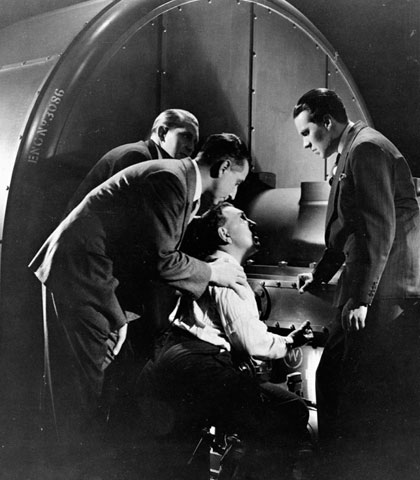…Even more distinctive of modern terrorism, as opposed to its origins, is the random nature of its violence. Earlier terrorists usually had some specific and comprehensible grievance against their victims. Quite often the attack was in retaliation for the acts of exceptional violence or cruelty, e.g., Vera Zasulich’s attempt to shoot General Trepov. Even the crowned heads, cabinet ministers, or high administrative officials who were assassinated, so to speak ex officio, had generally singled themselves out as particularly hateful representatives of a hated class or nation.

—The film opens with a definition of the word ‘sabotage’ as ‘wilful destruction of buildings or machinery with the aim of alarming a group of persons or inspiring public unease’. One can’t help thinking that there are times, and Sabotage is a prime example, when this definition could apply just as well to Hitchcock’s cinema.—click image for source…
Innocent bystanders were sometimes sacrificed, but most often the terrorists took special pains to avoid endangering them, even at considerable risk to their own lives. Before the young Russian Socialist Revolutionary Ivan Kaliaiev succeeded in assassinating the czar’s uncle, Grand Duke Sergius, the heavy-handed military governor of Moscow, in 1905, he twice in the same night waited in the street with a camouflaged bomb in his hands, and twice held back from throwing it, because the grand duchess and some of her nephews and nieces were also riding in the grand duke’s carriage.
In the Lod airport massacre, however, innocent bystanders were the primary target, for in all probability the airport crowd would consist of Israeli civilians with no direct responsibility for their government’s policies and even foreign tourists completely uninvolved in the Arab-Israeli vendetta. The comment attributed to Dr. George Habache head of the Palestinian PFL and prsumptive organizer of the operation- “There are no innocent tourists” – might indicate an almost clinically irrational hatred. Such hatreds do underlie many acts of terrorism today, but the minds behind those of the Palestinian terrorists, however twisted they may be, have repeatedly demonstrated a keen sense of psychological strategy.
There is good reason to believe that both the Lod raid and the still more spectacular kidnapping of nine members of the Israel Olympic team at Munich by commandos of the Black September organization some three months later were deliberately planned to produce the impression of irrational, almost maiacal violence. Consciously, or unconsciously, the planners of the two outrages put into effect the strategy of the absurd that Mr. Vladimir, the cynical, civilized embassy secretary in Conrad’s The Secret Agent, lays down for his anarchist agent provocateur, Mr. Verloc.
Vladimir orders him to perpetrate ” an act of destructive ferocity so absurd as to be incomprehensible, inexplicable, almost unthinkable: in fact, mad.” Such madness seems the most terrifying form of violence, Conrad’s diplomat goes on to explain, because “you cannot placate it either by threats, persuasion or bribes.”
He might also have added that madness, like lighning, is unpredictable; no one can foresee where it can strike next. The letter bombs, addressed to Jewish business or professional men of many nationalities, a number of them seemingly picked at random from the pages of a directory, represent probably the widest application of the principle of unpredictability in the annals of terrorism.








 COMMENTS
COMMENTS



